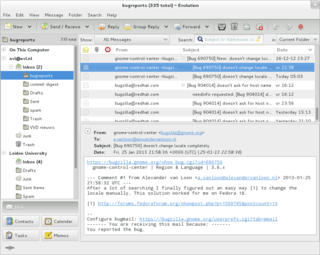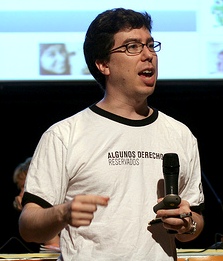
Electronic mail is a method of transmitting and receiving messages using electronic devices. It was conceived in the late–20th century as the digital version of, or counterpart to, mail. Email is a ubiquitous and very widely used communication medium; in current use, an email address is often treated as a basic and necessary part of many processes in business, commerce, government, education, entertainment, and other spheres of daily life in most countries.
In computer technology and telecommunications, online indicates a state of connectivity and offline indicates a disconnected state. In modern terminology, this usually refers to an Internet connection, but could refer to any piece of equipment or functional unit that is connected to a larger system. Being online means that the equipment or subsystem is connected, or that it is ready for use.
An internet relationship is a relationship between people who have met online, and in many cases know each other only via the Internet. Online relationships are similar in many ways to pen pal relationships. This relationship can be romantic, platonic, or even based on business affairs. An internet relationship is generally sustained for a certain amount of time before being titled a relationship, just as in-person relationships. The major difference here is that an internet relationship is sustained via computer or online service, and the individuals in the relationship may or may not ever meet each other in person. Otherwise, the term is quite broad and can include relationships based upon text, video, audio, or even virtual character. This relationship can be between people in different regions, different countries, different sides of the world, or even people who reside in the same area but do not communicate in person.
A mailing list is a collection of names and addresses used by an individual or an organization to send material to multiple recipients. The term is often extended to include the people subscribed to such a list, so the group of subscribers is referred to as "the mailing list", or simply "the list".
A virtual community is a social work of individuals who connect through specific social media, potentially crossing geographical and political boundaries in order to pursue mutual interests or goals. Some of the most pervasive virtual communities are online communities operating under social networking services.

Jonathan L. Zittrain is an American professor of Internet law and the George Bemis Professor of International Law at Harvard Law School. He is also a professor at the Harvard Kennedy School, a professor of computer science at the Harvard School of Engineering and Applied Sciences, and co-founder and director of the Berkman Klein Center for Internet & Society. Previously, Zittrain was Professor of Internet Governance and Regulation at the Oxford Internet Institute of the University of Oxford and visiting professor at the New York University School of Law and Stanford Law School. He is the author of The Future of the Internet and How to Stop It as well as co-editor of the books, Access Denied, Access Controlled, and Access Contested.

Internet culture is a quasi-underground culture developed and maintained among frequent and active users of the Internet who primarily communicate with one another online as members of online communities; that is, a culture whose influence is "mediated by computer screens" and information communication technology, specifically the Internet.
Future Culture, also known as FUTUREC or "FC" is a mailing list founded in 1992, that is concerned with online and internet culture. It currently resides on listserv.uark.edu.
mezangelle is a poetic-artistic language developed in the 1990s by Australian-based Internet artist Mez Breeze. It is recognized as a central contribution to Codework, Electronic literature, Internet Art and digital writing in general.
Internet identity (IID), also online identity, online personality, online persona or internet persona, is a social identity that an Internet user establishes in online communities and websites. It may also be an actively constructed presentation of oneself. Although some people choose to use their real names online, some Internet users prefer to be anonymous, identifying themselves by means of pseudonyms, which reveal varying amounts of personally identifiable information. An online identity may even be determined by a user's relationship to a certain social group they are a part of online. Some can be deceptive about their identity.
Cyberfeminism is a feminist approach which foregrounds the relationship between cyberspace, the Internet, and technology. It can be used to refer to a philosophy, art practices, methodologies or community. The term was coined in the early 1990s to describe the work of feminists interested in theorizing, critiquing, exploring and re-making the Internet, cyberspace and new-media technologies in general. The first use of the term cyberfeminist has been attributed to the art collective VNS Matrix's A Cyberfeminist Manifesto for the 21st Century which was published online in 1991.

Chabad.org is the flagship website of the Chabad-Lubavitch Hasidic movement. It was one of the first Jewish internet sites.
Online ethnography is an online research method that adapts ethnographic methods to the study of the communities and cultures created through computer-mediated social interaction. As modifications of the term ethnography, cyber-ethnography, online ethnography and virtual ethnography designate particular variations regarding the conduct of online fieldwork that adapts ethnographic methodology. There is no canonical approach to cyber-ethnography that prescribes how ethnography is adapted to the online setting. Instead individual researchers are left to specify their own adaptations. Netnography is another form of online ethnography or cyber-ethnography with more specific sets of guidelines and rules, and a common multidisciplinary base of literature and scholars. This article is not about a particular neologism, but the general application of ethnographic methods to online fieldwork as practiced by anthropologists, sociologists, and other scholars.
Alan Sondheim is a poet, critic, musician, artist, and theorist of cyberspace from the United States.

Nettime is an internet mailing list proposed in 1995 by Geert Lovink and Pit Schultz at the second meeting of the "Medien Zentral Kommittee" during the Venice Biennale. Since 1998, Ted Byfield and Felix Stalder have moderated the main list, coordinated moderation of other lists in the nettime "family," and maintained the site as their nexus.
A virtual body is the state of being when inhabiting virtual reality or a virtual environment.

Lisa Nakamura is an American professor of media and cinema studies, Asian American studies, and gender and women’s studies. She teaches at the University of Michigan, Ann Arbor, where she is also the Coordinator of Digital Studies and the Gwendolyn Calvert Baker Collegiate Professor in the Department of American Cultures.
Etiquette in technology, colloquially referred to as netiquette, is a term used to refer to the unofficial code of policies that encourage good behavior on the Internet which is used to regulate respect and polite behavior on social media platforms, online chatting sites, web forums, and other online engagement websites. The rules of etiquette that apply when communicating over the Internet are different from these applied when communicating in person or by audio or photographic phone. It is a social code that is used in all places where one can interact with other human beings via the Internet, including text messaging, email, online games, Internet forums, chat rooms, and many more. Although social etiquette in real life is ingrained into our social life, netiquette is a fairly recent concept.
Faces is an international online community of women who share an interest in digital media arts. They communicate via an email list and organize events both online and off. Founded in 1997, this informal network includes activists, artists, critics, theoreticians, technicians, journalists, researchers, programmers, networkers, web designers, and educators.
Fan studies is an academic discipline that analyses fans, fandoms, fan cultures and fan activities, including fanworks. It is an interdisciplinary field located at the intersection of the humanities and social sciences, which emerged in the early 1990s as a separate discipline, and draws particularly on audience studies and cultural studies.